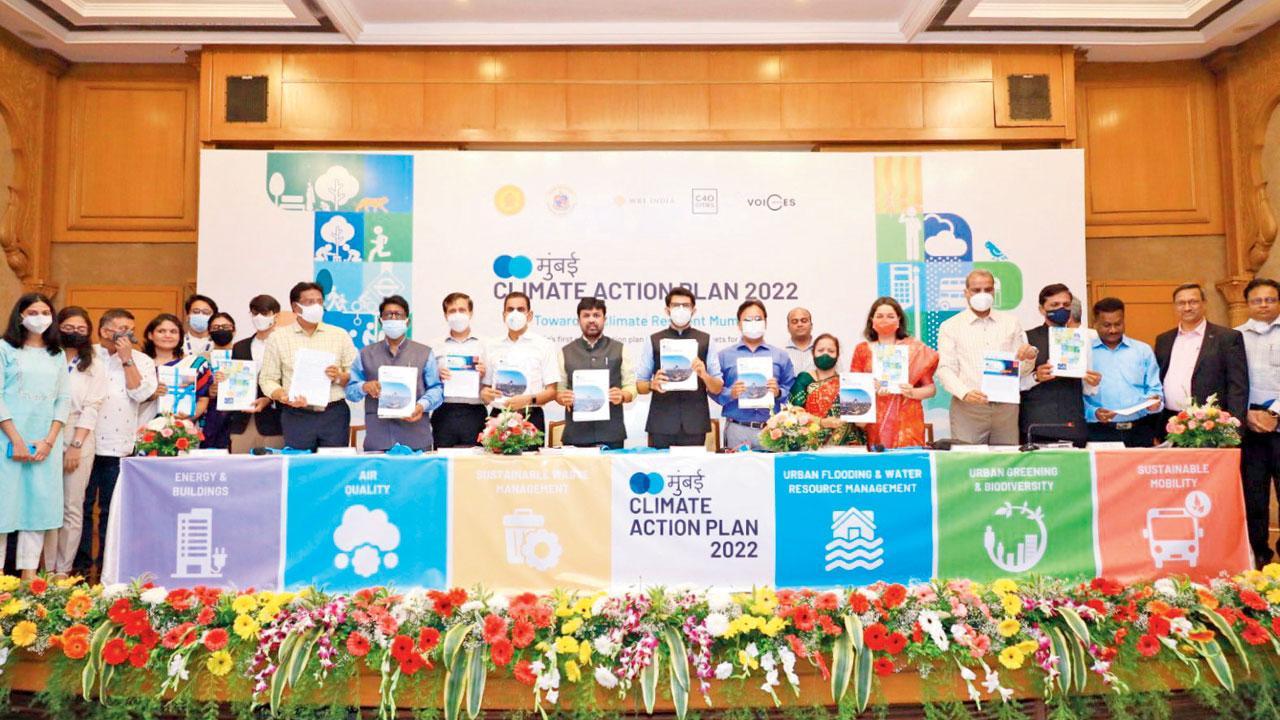Civic corporation releases Mumbai’s first-ever Climate Action Plan for a safer, healthier and inclusive city for its residents amid the climate crisis; deadline much ahead of Centre’s 2070

Environment Minister Aaditya Thackeray with other officials at the launch of MCAP on Sunday. Pic/TWITTER
Amid threats of severe damage due to rising sea level, critically high temperature and increased risk from climate impacts for coastal cities, the Brihanmumbai Municipal Corporation on Sunday inaugurated Mumbai Climate Action Plan (MCAP) and set a deadline to achieve net-zero greenhouse gas emissions by 2050. The plan was unveiled after a vulnerability assessment, greenhouse gas and natural green cover inventory done over the last six months by BMC with technical support from the World Resources Institute (WRI) India and the C40 Cities.
Chief Minister Uddhav Thackeray said, “While India is on pace to meet its nationally determined contributions, Maharashtra is committed to leading India’s battle against the impending climate crisis through policy-governance changes and instilling the culture of climate action. The MCAP is designed to fulfil the Paris Agreement’s aim of reducing global warming to 1.5 degrees Celsius. Mumbai will become a climate-resilient metropolis as a result of the evidence-based policies that led to the creation of MCAP.”
“Various recent extreme weather disasters in Maharashtra, such as Cyclone Tauktae, urban floods, and untimely rains have demonstrated the importance of implementing localised mitigation and resilience techniques. Our goal is to urge people to take action on climate change at the local level. In a city like Mumbai, achieving climate resilience requires striking the ideal balance between development aspirations and environmental preservation,” said Aaditya Thackeray, state environment minister.
The plan’s interim and long-term objectives include a 30 per cent decrease in emissions by 2030, a 44 per cent reduction by 2040, and a net-zero reduction by 2050 compared to base year emissions (2019). For 2019, the base year emissions were calculated to be 23.42 million tonnes of carbon dioxide emissions (CO2e), or 1.8 tonnes CO2e per person.
According to a future emission analysis under MCAP, emissions have been predicted to reach 64.8 million tonnes CO2e/year by 2050 under the business as usual scenario (without mitigation activities), growing 2.7 times between 2019 and 2050. Emissions are predicted to reach 51.3 million tonnes CO2e/year by 2050 under the existing and planned scenario, an 119.4 per cent increase above base year emissions.
An ‘ambitious yet achievable’ scenario for Mumbai is modelled to set targets of 27 per cent reduction by 2030 and 72 per cent by 2050. However, considering India’s recent commitments at COP26 of generating 500 GW of renewable energy by 2050, source 50 per cent of its energy demand from renewables by 2030 and a net-zero target for the country by 2070, Mumbai’s long-term goal of achieving net-zero is certain.
“There is a 30 per cent gap of ‘residual emissions’, two-thirds of this is dependent on a speedy transition of cooking fuels to electric in all buildings, scientific treatment of wastewater, and protecting and leveraging the carbon sink potential of our natural ecosystems,” said Lubaina Rangwala, program head of the urban development and resilience team at WRI India.
MCAP focuses on six sectors in order to provide sector-specific mitigation and adaptation strategies—decarbonising Mumbai's energy grid and building energy-efficient infrastructure, implementing a zero-landfill waste management plan, reducing water-sanitation inequity and adopting nature-based solutions for water conservation and flood risk management, reducing heat risk and increasing the city's resilience to flooding events, and reducing air pollution.
“To guarantee continuity and consistency across outcome indicators and objectives, the six sectoral action plans align with important national programmes and policies such as the National Clean Air Action Planning standards, Swachh Bharat Mission targets, and the Climate Smart Cities guidelines,” said BMC Commissioner I S Chahal.
“Mumbai has thoroughly studied sources of GHG emissions, effects of climate change, opportunities for climate change mitigation, as well as robust steps towards monitoring implementation,” said Shruti Narayan, Regional Director (South and West Asia), C40 Cities.
30 per cent
Expected decrease in emissions by 2030
 Subscribe today by clicking the link and stay updated with the latest news!" Click here!
Subscribe today by clicking the link and stay updated with the latest news!" Click here!










